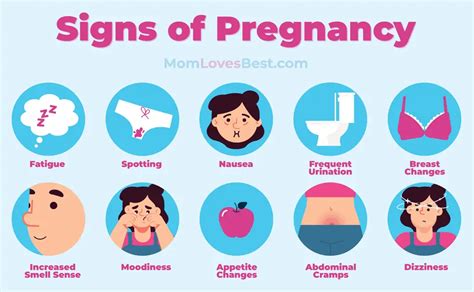Introduction

Pregnancy is a transformative journey that brings immense joy and responsibility. Knowing if you are pregnant is crucial for taking care of yourself and your potential baby. Here’s an extensive guide to help you identify the signs and symptoms of pregnancy.
Early Signs of Pregnancy (Weeks 1-4)
- Missed period: One of the most common early signs is a missed menstrual period. If you are usually regular with your cycle, a delay of more than a week may indicate pregnancy.
- Nausea and vomiting: Morning sickness typically begins around weeks 6-8 and is experienced by approximately 70-80% of pregnant women.
- Breast tenderness and enlargement: Increased blood flow to the breasts can cause them to become sore, swollen, and darker in color.
- Fatigue: Fatigue is a common symptom during the first trimester as the body produces the pregnancy hormone progesterone.
- Frequent urination: As the uterus expands, it puts pressure on the bladder, leading to more frequent bathroom breaks.
Later Signs of Pregnancy (Weeks 5-12)
- Darkening of the nipples (areola): The areolas may darken and become larger.
- Montgomery’s tubercles: Small bumps may appear on the areolas.
- Increased basal body temperature: Your body temperature rises slightly during pregnancy.
- Bloating and constipation: Progesterone can cause bloating and constipation.
- Skin changes: Darkening of the skin under the arms, between the thighs, and on the face is common.
Medical Confirmation
- Home pregnancy test: These over-the-counter tests detect the presence of human chorionic gonadotropin (hCG), a hormone produced during pregnancy. While some tests have a high accuracy rate, it is recommended to confirm with a healthcare professional.
- Blood test: A blood test can detect hCG as early as 10 days after conception.
- Transvaginal ultrasound: This ultrasound is more sensitive than an abdominal ultrasound and can detect the pregnancy sac as early as 3-4 weeks.
Other Possible Signs
- Changes in mood: Emotional fluctuations can occur due to hormonal changes.
- Elevated heart rate: Your heart rate may increase slightly.
- Increased saliva production: Some women experience excessive saliva production during pregnancy.
- Cravings and food aversions: Unusual cravings and aversions to certain foods may develop.
When to See a Doctor
If you suspect you may be pregnant, it is crucial to consult a healthcare professional promptly. Regular prenatal appointments are essential to monitor your health and ensure the well-being of your developing baby.
Table 1: Signs of Pregnancy by Week
| Week | Common Symptoms |
|---|---|
| 1-4 | Missed period, nausea, breast tenderness, fatigue, frequent urination |
| 5-8 | Darkening of nipples, Montgomery’s tubercles, morning sickness, bloating |
| 9-12 | Increased basal body temperature, constipation, skin changes |
| 13-16 | Fetal heartbeat detected by Doppler, abdominal growth |
| 17-20 | Quickening (fetal movement), Braxton Hicks contractions |
Table 2: Accuracy of Home Pregnancy Tests
| Brand | Sensitivity (hCG level) | Accuracy |
|---|---|---|
| Clearblue Ultra Early Detection | 10 mIU/mL | 99% |
| First Response Early Result | 6.3 mIU/mL | 99% |
| PregSure | 25 mIU/mL | 97% |
| Dollar Store Tests | N/A | 50-80% |
Table 3: Pain Points and Motivations
| Pain Point | Motivation |
|---|---|
| Uncertainty | Desire to confirm or rule out pregnancy |
| Worry about health | Concern for the health of the potential baby |
| Need for medical advice | Seeking guidance from healthcare professionals |
Table 4: Benefits of Knowing if You are Pregnant
| Benefit | How it Matters |
|---|---|
| Early prenatal care | Ensures healthy pregnancy and child development |
| Lifestyle changes | Modifying habits to protect the baby |
| Informed decision-making | Making choices about your future |
| Peace of mind | Reducing anxiety and uncertainty |
FAQs
- Can I still get pregnant if I have irregular periods? Yes, it is possible, but more difficult.
- How soon can I take a home pregnancy test? Most tests recommend waiting about a week after a missed period.
- What if my test is positive but I don’t have any symptoms? Some women may experience symptoms later in the pregnancy.
- Is it safe to take multiple home pregnancy tests? Yes, but using different brands may provide more accurate results.
- What should I do if my test is negative but I still suspect I am pregnant? Consult a healthcare professional for further testing.
- Is morning sickness a sign of a healthy pregnancy? While common, it is not always present.
- How long does pregnancy last? Typically around 40 weeks from the first day of your last menstrual period.
- What are the risks of being pregnant at a young age? Adolescents have a higher risk of health complications, premature birth, and low birth weight.
Conclusion
Knowing if you are pregnant is a pivotal step in embarking on the journey of parenthood. By recognizing the signs and symptoms, you can seek medical confirmation and ensure the health and well-being of your potential baby. Embrace this transformative experience with confidence and excitement.
















